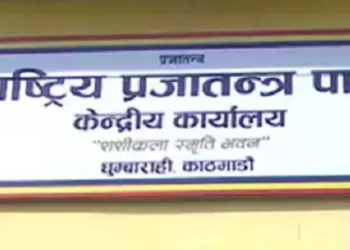KATHMANDU: Economic Digest offers a concise yet comprehensive overview of significant business happenings in Nepal, presented in easily digestible summaries.
The decline in capital investment among telecom service providers reflects broader challenges in the industry, including shrinking revenues and inadequate infrastructure investment.
With telecom companies now dedicating only 10% of their income to infrastructure development—down from nearly 50% in the past—future growth and service quality are at risk.
Contributing factors include outdated laws, high renewal fees, and competition from over-the-top (OTT) platforms, which have added operational complexities.
This reduction in investment, coupled with economic uncertainty, poses a threat to the sustainability of these companies.
In contrast, sectors like gold and silver trading show resilience, with rising prices, and initiatives like the industrialization of homemade alcohol in Halesi Tuwachung suggest efforts to diversify and stimulate local economies.
Overall, the telecom sector’s struggle highlights the impact of regulatory and financial challenges on crucial industries, while other sectors show signs of growth and innovation.
Telecom Service Providers’ capital investment declines
Telecom service providers are experiencing a decline in capital investment as their income continues to shrink.
The reduction in income, coupled with a decreased budget allocation for infrastructure development, has impacted service expansion, upgrades, and the delivery of quality services. Experts warn that the future of these companies looks uncertain.
Telecom companies, which once dedicated nearly half of their total income to infrastructure development, are now limiting this expenditure to around 10 percent.
Industry experts believe that telecom providers are reluctant to invest in necessary infrastructure due to shrinking income, outdated laws, high renewal fees, and the operational challenges posed by over-the-top (OTT) platforms, among other factors.
NEPSE drops 14 points, turnover rises by NPR 8 billion
The Nepal Stock Exchange (NEPSE) index, which had been rising for the first two days of the week, saw a decline of 14.8 points on Tuesday. The total turnover for the day reached NPR 8.92 billion.
On Tuesday, the share prices of 162 companies fell, while 71 companies saw an increase in their share prices. Nine companies had stable share prices.
Gold and silver prices rise
Gold prices in the local market increased on Tuesday. According to the Nepal Gold and Silver Dealers’ Federation, the price of gold rose by NPR 1,900 per tola, reaching NPR 164,700.
On Monday, gold was traded at NPR 162,800 per tola. Silver prices also saw a rise of NPR 20 per tola, reaching NPR 1,930 on Tuesday, compared to NPR 1,910 on Monday.
House construction permits now available online
The Ministry of Urban Development has launched the ‘Nepal National Building Code Compliance Promotion Project for Safe Building Construction,’ with support from the Japan International Cooperation Agency (JICA).
The project aims to increase the knowledge and awareness of homeowners, construction professionals, and technicians.
This initiative will help ensure the effective implementation of the building code in houses and buildings, focusing on design, inspections during the construction phase, and enhancing the supervisory and quality assurance capabilities of technicians and construction professionals.
Halesi Tuwachung begins industrialization of homemade alcohol
Halesi Tuwachung Municipality has initiated efforts to promote the industrialization of locally produced alcohol.
The municipality has formulated a procedure to legally produce homemade alcohol, aiming to encourage local production and reduce reliance on imported beverages.
Mayor Bimala Rai announced the launch of the ‘Local Alcohol Industrialization Program,’ which seeks to commercialize traditional homemade alcohol, increase income for local women, and promote the product, which has been part of the community’s culture for generations.
Nepal Drug Limited receives WHO GMP certificate
Nepal Drug Limited has received the World Health Organization’s Good Manufacturing Practice (GMP) certificate, marking a major milestone for the company.
General Manager Kailash Kumar Paneru confirmed that the company received the internationally recognized certificate on Tuesday from the Department of Drug Management, fulfilling all required standards.
Established in 2029 BS, the company was unable to produce drugs under GMP standards until 2064 BS, when the certification requirement came into effect.
It has only now resumed production under these standards, receiving the GMP certificate after meeting the necessary criteria since 2074 BS.
Oranges worth NPR 527.6 million sold in Palpa
Palpa has produced 9,098 metric tons of oranges this year, an increase of 337 metric tons from last year’s 8,861 metric tons, according to the Agricultural Knowledge Center.
This year, oranges worth NPR 527.684 million were sold, surpassing last year’s total of NPR 467.72 million.
The increased sales have brought an additional NPR 66.912 million into the district.









Comment